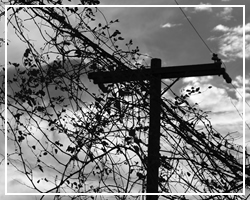Section 5. Structures and Utilities
Structures.
Farm Security
Electricity Disruptions
Extended power outages can disrupt essential farm operations.  Even brief outages can be costly for a farm business, especially those with livestock operations such as dairy, poultry or other confined animals. It is important to select an appropriately sized generator or an alternative source of electrical power, such as batteries, based on the needs of your operation. When selecting a generator, don’t focus only on the price per kilowatt of generator capacity. Determine the size needed to power only essential electric loads. Add up these loads to determine the kilowatt capacity needed. Also keep in mind that electric motors draw three to five times more power at starting than when running under full load. The type of generator (manual, semiautomatic or automatic) will also influence the correct load rating and the cost. A manual unit allows selection of the equipment to be connected during the emergency, but requires personnel to start and connect the generator and to change equipment connections to the electrical system to stay within generator capacity. Notify your local electric utility company if you plan to use a standby generator in case of power failure. |
